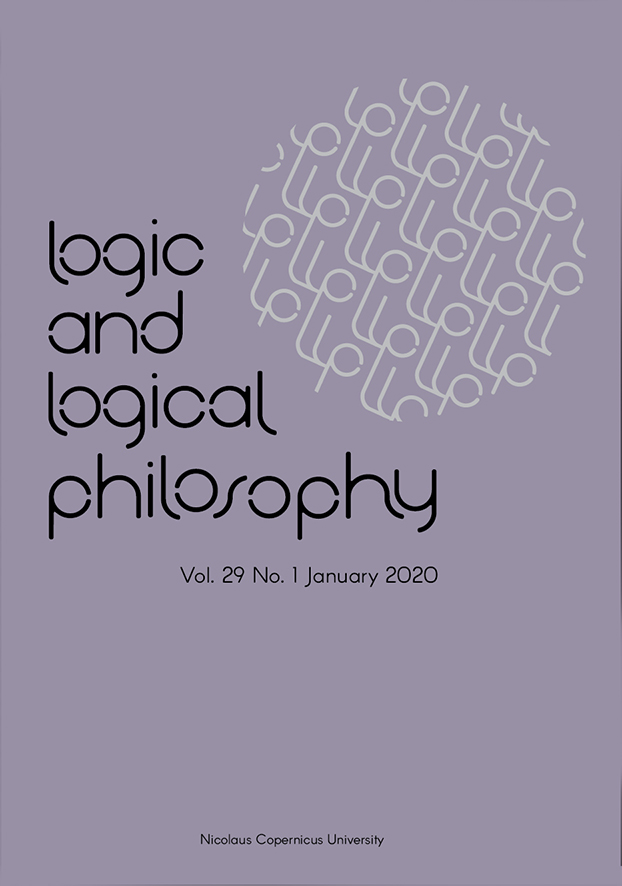Logic and Sets
DOI:
https://doi.org/10.12775/LLP.2019.023Keywords
extensions, sets, Gottlob Frege, unsaturated functions, extensional thesis, set theoryAbstract
The notion of the extension of a concept has been used in logic for a long time. It is usually considered to be closely connected to the intuitive notion of a set and thus seems as though it should be embedded into set theory. However, there are significant differences between this “logical” concept of set and the notion of set (class) as defined via standard axiomatic systems of set theory; it may, therefore, be quite misleading to consider the two concepts as being continuous with each other. When we look at the writings of Gottlob Frege and consider the development of his attitude to extensions, we can see what the differences consist in and which of the two notions is more apt to be used in foundations of logic. Frege himself eventually rejected sets entirely.
References
Angelelli, I., Studies on Gottlob Frege and Traditional Philosophy, D. Reidel Publishing Company, Dordrecht, 1967. DOI: http://dx.doi.org/10.1007/978-94-017-3175-1
Aristotle, Complete Works, J. Barnes (ed.), Princeton University Press, Princeton, N.J., 1991.
Arnauld, A.,and P. Nicole, The Port-Royal Logic, transl. T.S. Baynes, Edinburg, 1861.
Bagaria, J., “Set Theory”, The Stanford Encyclopedia of Philosophy, Spring 2017 Edition, E.N. Zalta (ed.), https://plato.stanford.edu/archives/spr2017/entries/set-theory/
Benacerraf, P., “What numbers could not be”, The Philosophical Review 74, 1 (1965): 47—73. DOI: http://dx.doi.org/10.2307/2183530
Bernays, P., Axiomatic Set Theory, with a Historical Introduction by A.A. Fraenkel, North-Holland, Amsterdam, 1958.
Boole, G., “An investigation of the laws of thought”, by G. Boole; Project Gutenberg. www.gutenberg.net [8] Boolos, G., “Iterative conception of sets”, in P. Benacerraf and H. Putnam (ed.), Philosophy of Mathematics. Selected Readings, Cambridge University Press, 1983. DOI: http://dx.doi.org/10.1017/CBO9781139171519.026
Cantor, G., “Beiträge zur Begründung der transfiniten Mengenlehre“, in Mathematische Annalen 46 (1895).
Cantor, G., Contributions to the Founding of the Theory of the Transfinite Numbers, transl. P.E.B. Jourdain, Dover Publications, New York, 1915.
Cantor, G., Grundlagen einer allgemeinen Mannigfaltigkeitslehre, Leipzig 1883, in Georg Cantor, Gesammelte Abhandlungen Mathematischen und Philosophischen Inhalts, Georg Olms Hildesheim, 1962.
Carnap, R., “Eigentliche und Uneigentliche Begriffe“, Symposion 1 (1927): 355–374.
Carnap, R., Meaning and Necessity, The University of Chicago Press, Chicago and London, 1964.
Dathe, U., “Freges Weg vom Logicismus zum Versuch einer geometrischen Grundlegung der Arithmetik“, Modern Logic 3, 4 (1993).
Dummett, M.: Frege – Philosophy of Language, Harper and Row, 1973.
Frege, G.: The Basic Laws of Arithmetic, ed., transl. by M. Furth, University of California Press, Berkeley and Los Angeles, 1964 (Die Grundgesetze der Arithmetik. Begriffsschriftlich abgeleitet. I–II, Verlag von Hermann Pohle, Jena 1893/1903.)
Frege, G.: “Begriffschrift”, in P. Geach and M. Black (eds.), Translation from the Philosophical Writings of Gottlob Frege, transl. P. Geach, Basil Blackwell, Oxford, 1960. (Begriffsschrift, eine der arithmetischen nachgebildete Formelsprache des reinen Denkens, Louis Nebert, Halle a. S. 1879.)
Frege, G., Collected Papers on Mathematics, Logic, and Philosophy, ed. By B. McGuinness, Basil Blackwell, Oxford, 1984, (“Funktion und Begriff“, Verlag von Hermann Pohle, Jena 1891; “Rezension von Dr. E.G. Husserl: Philosophie der Arithmetik, Zeitschrift für Philosophie und philosophische Kritik 103 (1894): 313–332; “Über Begriff und Gegenstand“, Vierteljahrsschrift für wissenschaftliche Philosophie 16 (1892): 192–205; “Über und Bedeutung“, Zeitschrift für Philosophie und philosophische Kritik 100 (1892): 25–50; “Was ist eine Funktion”, Festschrift Ludwig Boltzmann gewidmet zum sechzigsten Geburtstage 20 (1904), S. Meyer (ed.), Leipzig 1904, 656–666.)
Frege, G., The Foundations of Arithmetic, transl. by J.L. Austin, Harper, New York, 1960. (Die Grundlagen der Arithmetik. Eine logisch mathematische Untersuchung über den Begriff der Zahl, W. Koebner, Breslau, 1884.)
Frege, G., Philosophical and Mathematical Correspondence, transl. H. Kaal, Basil Blackwell, Oxford, 1980. (Wissenschaftlicher Briefwechsel, Felix Meiner Verlag, Hamburg, 1976.)
Frege, G., Posthumous Writings, transl. by P. Long and R. White, Basil Blackwell, Oxford, 1979. (Nachgelassene Schriften, Meiner, Hamburg, 1969.)
Gödel, K., “Russell’s mathematical logic”, in P. Benacerraf and L., Putnam (eds.), Philosophy of Mathematics. Selected Readings, Cambridge University Press, 1983. DOI: http://dx.doi.org/10.1017/CBO9781139171519.024
Grattan-Guiness, I., The Search for Mathematical Roots 1870–1940, Princeton University Press, 2000.
van Heijenoort, J., “Historical development of modern logic”, Modern Logic 2, 3 (1992): 242–255. DOI: http://dx.doi.org/10.1007/s11787-012-0064-7
van Heijenoort, J., “Introduction to Frege’s Begriffschrift”, in From Frege to Gödel: A Source Book in Mathematical Logic, 1879–1932, Harvard University Press, 1967.
Künne, W., Die Philosophische Logik Gottlob Freges, Klostermann, 2010.
Lavine, S., Understanding the Infinite, Harvard University Press, London, 1994.
Liu, Y., “Frege’s Begriffsschrift is indeed first-order complete”, History and Philosophy of Logic 2017. DOI: http://dx.doi.org/10.1080/01445340.2017.1350549
Maddy, P., Realism in Mathematics, Clarendon Press, Oxford, 1990. DOI: 1 http://dx.doi.org/0.1093/019824035X.001.0001
Potter, M., Set Theory and Its Philosophy, Oxford University Press, 2009 (2004). DOI: http://dx.doi.org/10.1093/acprof:oso/9780199269730.001.0001
Quine, W. V., “On Frege’s way out”, Mind 64, 254 (1955): 145–159. DOI: http://dx.doi.org/10.1093/mind/LXIV.254.145
Quine, W. V., Philosophy of Logic, Harvard University Press, 2nd Ed., Cambridge and London, 1986.
Quine, W. V., Set Theory and Its Logic, Harvard University Press, Cambridge, 1969.
Tarski, A., and S.R. Givant, Formalisation of Set Theory Without Variables, Colloquium Publications, vol. 41, American Mathematical Society, Providence, R.I., 1987.
Tarski, A., “The semantic conception of truth”, Philosophy and Phenomenological Research IV, 3 (1944): 341–376.
Downloads
Published
How to Cite
Issue
Section
Stats
Number of views and downloads: 897
Number of citations: 0







